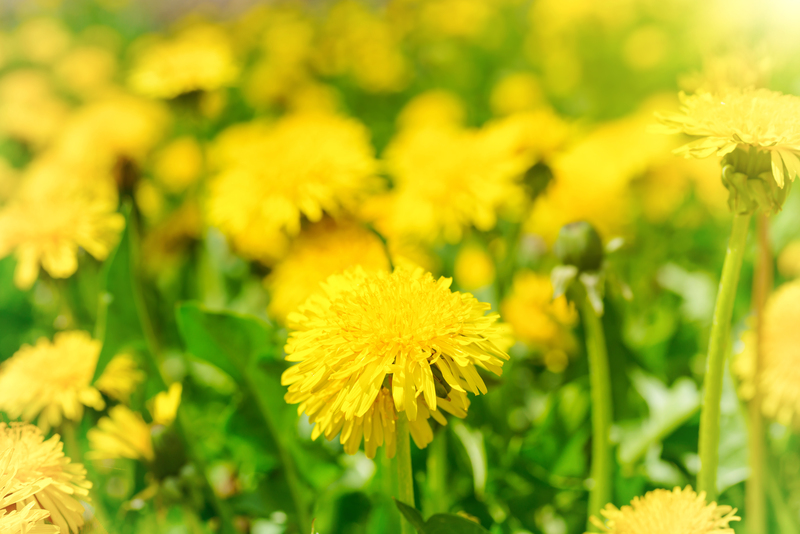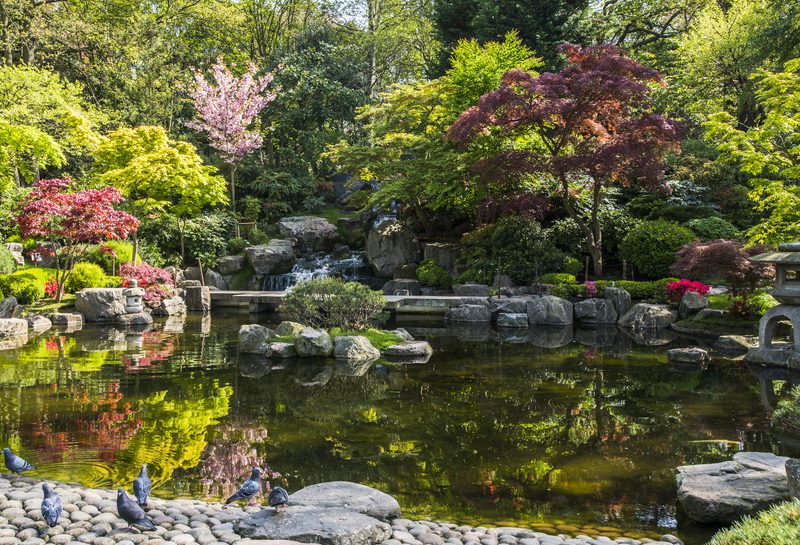Ensure Your Herb Garden Grows Strong and Healthy
Posted on 05/06/2025
Ensure Your Herb Garden Grows Strong and Healthy: The Expert's Guide
There's nothing quite as rewarding as walking out to your backyard or onto your windowsill and snipping fresh herbs for your cooking. But achieving a strong and healthy herb garden requires more than just planting seeds and hoping for the best. Whether you're a beginner or a seasoned horticulturist, learn how to ensure your herb garden flourishes with our comprehensive, SEO-optimized guide.
Why a Strong & Healthy Herb Garden Matters
Healthy herbs offer more flavor, better aroma, and increased nutritional value. In addition, a thriving herb garden contributes to your landscape's biodiversity, attracts pollinators, and can even help keep pests at bay!
- Fresh flavors: Homegrown herbs taste superior to store-bought varieties.
- Cost savings: Grow your own and stop relying on expensive supermarket bundles.
- Therapeutic benefits: Gardening reduces stress and boosts well-being.

Choosing the Right Location for a Healthy Herb Garden
Sunlight is vital for ensuring your herb garden grows strong. Most herbs love at least six hours of direct sunlight. Pick a spot - whether it's a sunny kitchen window or an outdoor plot - that bathes your herbs in sunlight.
Assessing Your Space
- Windowsills: Ideal for small, indoor herb gardens. South- or west-facing windows are best.
- Balconies & Patios: Use planters or containers. Ensure they get enough light and air circulation.
- Outdoor Beds: Raised beds or dedicated patches work well for multiple varieties.
Soil Quality: The Foundation of Herb Health
To ensure your herb garden is robust, start with healthy soil. Most culinary herbs prefer well-drained, mildly alkaline soil (pH 6.0-7.5). Rich, loose, and friable soil encourages healthy root growth and prevents waterlogging.
- Amend with compost to enhance fertility.
- Add sand or perlite for better drainage, especially for Mediterranean herbs like rosemary and lavender.
- Avoid compacted or heavy clay soils.
Smart Selection: Which Herbs to Grow for Success
Picking suitable herbs will ensure your herb garden stays strong and healthy year-round. Some herbs are hardier and easier for beginners, while others need a bit more attention.
Best Herbs for Beginners
- Basil: Fast-growing and aromatic, perfect for windowsills or gardens.
- Mint: Vigorous and almost indestructible, though it spreads quickly.
- Chives: Hardy and tolerant, suitable for small spaces.
- Parsley: Rich in nutrients and easy to grow from seed.
- Thyme & Oregano: Thrives on neglect and poor soils.
Perennials vs. Annuals
Perennials (e.g., thyme, rosemary, sage, mint) return every year with minimal effort, helping to maintain a healthy herb garden. Annuals (e.g., basil, cilantro, dill) need re-planting each season but often offer abundant harvests in one go.
Secrets to Planting Your Herb Garden the Right Way
Starting from Seeds vs. Seedlings
- Seeds: Cost-effective, offers more variety, but requires patience and care.
- Seedlings/Transplants: Get a head start and reduce risk of failure, especially for novices.
Spacing and Depth: Give Them Room to Grow
- Follow packet instructions for depth - most herb seeds need just a sprinkle of soil.
- Space adequately: Crowded plants are more prone to mildew and pests.
- Label each row or pot clearly for easy identification as they sprout.
Watering Wisely: Keep Your Herb Garden Hydrated and Healthy
Consistent but not excessive watering is the path to keeping your herb garden strong. Overwatering is the single biggest killer of potted herbs.
How Often Should You Water Herbs?
- Herbs prefer moist, but not soggy soil.
- Water early in the morning for best absorption.
- Use your finger to test soil moisture; water when the top inch feels dry.
- Container herbs may dry out faster than those in the ground - check daily in summer.
Drainage Is Key
Always use pots with drainage holes and avoid letting containers sit in standing water. Root rot can cause herbs to wilt and die quickly.
Fertilizing for Vigorous Growth
To ensure your herbs are healthy and lush, provide occasional feeding, but don't overdo it--too much fertilizer leads to leafy herbs with less flavor.
- Compost: Add slow-release nutrients naturally.
- Fish emulsion or seaweed extracts: Fantastic for organic feeding.
- Avoid synthetic fertilizers - especially if you want to keep your garden organic and chemical-free.
Pest and Disease Prevention: Keeping Your Garden Safe
Common Pests in Herb Gardens
- Aphids: Tiny, sap-sucking insects. Use a strong water spray or neem oil.
- Whiteflies: Sticky and hard to spot; introduce ladybugs or use insecticidal soap.
- Slugs & Snails: Protect with copper tape or organic slug pellets.
Disease Prevention Tips
- Promote airflow: Space plants properly and regularly prune overcrowded stems.
- Water at the base: Wet leaves foster fungal diseases.
- Rotate crops: Prevents soil-borne issues in multi-year beds.
Pruning and Harvesting: Encourage Vigorous Growth
Strategic harvesting can actually strengthen your herb garden's health. Pruning encourages new growth and stops herbs like basil and mint from getting leggy or flowering too early.
- Snip regularly: Cut above a pair of leaves for bushier plants.
- Harvest in the morning, when essential oils are most concentrated.
- Don't strip more than one-third of the plant at once to prevent stress.
Overwintering: Protecting Your Herb Garden in Cold Climates
For those in temperate or cold regions, winterizing your herb garden is critical. Many perennials can survive mild winters with minimal preparation, but tender herbs may need extra care.
Winter Preparation Tips for a Strong Herb Garden
- Mulch outdoor beds with straw or leaf litter to insulate roots.
- Bring potted herbs inside, placing them near bright windows.
- Reduce watering as herbs enter dormancy. Avoid soggy soil during cold months.
- Grow herbs on sunny sills over winter for a year-round supply.
Container Gardening: Grow Healthy Herbs Even with Limited Space
If yard space is minimal, you can still ensure a strong and thriving herb garden in containers. The versatility of pots allows you to move plants for optimal light and shelter them from extreme weather.
- Choose the right size: Most herbs need containers at least 6-8 inches deep.
- Group compatible herbs: Mediterranean herbs (thyme, rosemary, oregano) like drier soil; parsley and basil prefer more moisture.
- Use lightweight, breathable pots for better root health.
Companion Planting for Healthier Herbs
Herbs can benefit from being paired with the right neighbors. Companion planting deters pests, attracts pollinators, and promotes healthier growth.
- Basil + tomatoes: Basil enhances the flavor and health of tomatoes.
- Chives near carrots: Deters carrot root fly.
- Mint around cabbage: Repels aphids and flea beetles (but contain mint, or it will overrun your garden).
Organic Approaches for a Sustainable Herb Garden
Cultivating a strong, healthy herb garden without chemicals ensures your harvest is safe and eco-friendly.
- Use beneficial insects like ladybugs to manage pests.
- Encourage biodiversity with diverse planting and native flowers.
- Homemade compost teas and mulches enrich soil naturally.
Common Mistakes and How to Avoid Them
- Over-fertilizing: Leads to lush but flavorless herbs.
- Improper watering: Both underwatering and overwatering can be fatal.
- Lack of pruning: Causes herbs to become woody, flower prematurely, or lose flavor.
- Ignoring pests and disease signs: Early detection is key to saving your crops.

Frequently Asked Questions about Growing a Healthy Herb Garden
What herbs grow well together?
Group herbs with similar water and light needs, such as basil and parsley, or rosemary and thyme. Avoid planting mint with other herbs unless in a separate container, as it can be invasive.
Should I grow herbs from seed or buy seedlings?
Starting from seed is cheaper but can be trickier. Many gardeners start with seedlings for difficult-to-germinate herbs like rosemary or lavender.
How do I know when to harvest my herbs?
Start cutting leaves once plants are 6-8 inches tall, and always harvest before flowering for the best taste.
Conclusion: Strong, Healthy Herbs Are Within Your Reach
With a little planning and ongoing care, you can ensure your herb garden grows strong and healthy--no matter your space or skill level. Commit to choosing the right site, enriching your soil, watering and feeding correctly, and regular harvesting. Embrace organic and sustainable gardening practices, and your herbs will reward you with flavor, fragrance, and health for seasons to come.
Start your journey to a thriving herb garden today and enjoy the bounty of fresh, healthy herbs every day!
Latest Posts
Chic Hedge Designs: Trimming Techniques to Impress
Frost Foes: Strategies to Shield Your Garden from Winter's Grip
Nature's Blueprint: Using Gardens to Combat Climate Change

